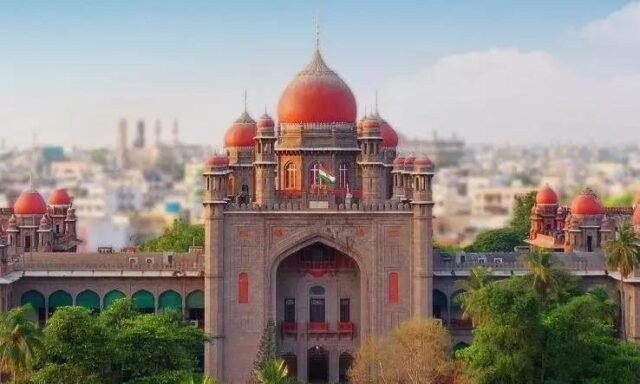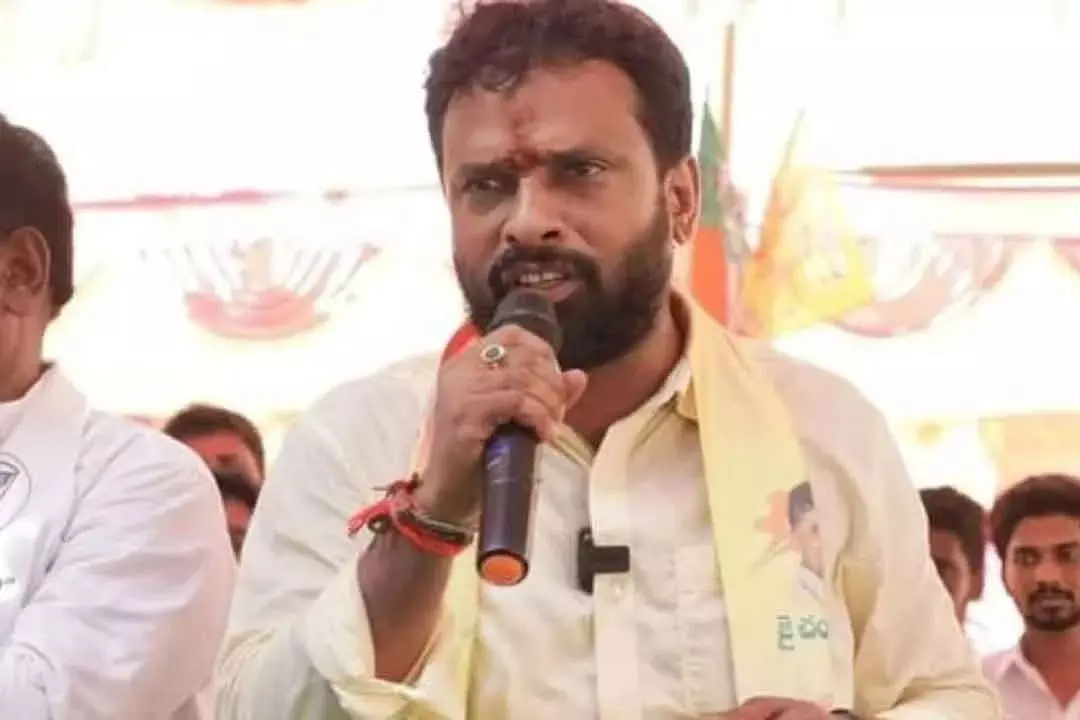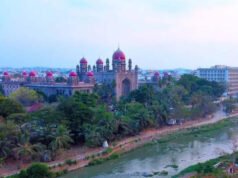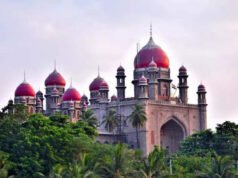Hyderabad: Justice T. Madhavi Devi of the Telangana High Court took on file a writ plea filed by four members of a family from Narayanpet district, challenging alleged attempts by the authorities to lay a blacktop (B.T.) road through their agricultural lands without following the due process of law. The judge was hearing a writ plea filed by Pavan Kumar Parade and others. The petitioners contended that officials of the panchayat raj department, including the executive engineer, along with the district collector and the mandal development officer, were acting arbitrarily in seeking to lay a road from Krishna Railway Bridge to Gurajala Village through their private lands, measuring about 3.48 acres in Krishna Village. The petitioners submitted that the land has historically been under agricultural use by their family and that a car track laid for their private access is now being claimed by villagers as a public path. They argued that mere usage by some locals does not create a public right of way and that only a notified village map could determine the status of the land. It was further contended that satellite imagery or Google Maps do not establish any legal right for the state to treat the car track as a public road. The revenue authorities, however, contended that there was no formal proposal for laying of the B.T. road and that no requisition had been received by them from the panchayat raj department for acquisition or for initiation of proceedings. The judge directed the revenue respondents to produce the relevant village map to verify the status and nature of the land in question.
HC rebukes SHO for contempt
Justice B. Vijaysen Reddy of the Telangana High Court issued a strong warning to the Station House Officer of Nakrekal Police Station for contempt in connection with a land dispute and police aid concerning agricultural land in Nomula village, Nalgonda district. The judge was dealing with a contempt petition filed by Kandala Saraswathi. Appearing in person, the petitioner alleged that despite prior directions from the court and approval from the mandal revenue officer, the SHO obstructed her cultivation activities and even threatened her with arrest. She also accused him of reporting for duty under the influence of alcohol. The dispute pertains to roughly 20 guntas of agricultural land, where repeated interference by the local police led to multiple judicial directions. The High Court earlier issued order for land demarcation and police aid, but execution reportedly remained stalled. In response, the government pleader argued that the petitioner failed to properly identify the land in question. However, the judge found prima facie evidence of disobedience and reiterated earlier directions for police protection, conditional upon the petitioner producing prior court orders and accurately demarcating the land. The judge warned that continued defiance would necessitate the personal appearance of SHO Rajashekar before the Court.
HC boosts victim compensation award
Justice Renuka Yara of the Telangana High Court enhanced the compensation awarded to a 21-year-old accident victim from Rs 6,16,623 to Rs 15,03,623 with 9 per cent interest per annum, holding that the Motor Accident Claims Tribunal inadequately considered the nature of injuries and resulting hardship. The judge was hearing a MACMA appeal filed by Bheemanathi Rajasekhar, who sustained grievous head injuries in a motor vehicle accident in December 2017. According to the appellant, the accident occurred when the motorcycle on which he was riding pillion was hit by an auto driven in a rash and negligent manner. The claimant contended that the injuries required cranial surgery and led to long-term memory loss and behavioural disturbances. The tribunal earlier awarded Rs 6.16 lakh but exonerated the insurer, directing it to pay and recover from the vehicle owner. Challenging the quantum of compensation, the appellant sought enhancement on several grounds, including permanent disability, future medical expenses, and loss of earning capacity. Justice Yara, noting the absence of any disability certificate, held that the evidence on record particularly the testimony of a neurosurgeon was sufficient to award compensation for future loss of amenities and income. The judge held that the earlier award of Rs 5,000 towards pain and suffering was inadequate and enhanced it to Rs 50,000. The judge also took into account estimated costs of future surgery and lifelong medication to prevent epileptic seizures. Taking into consideration all heads of compensation including pain and suffering, medical expenses, loss of income, future surgery, and future medical costs, the judge held the claimant was entitled to a enhanced compensation. The insurer, Iffco-Tokio General Insurance Company, was directed to pay the enhanced compensation within two months and recover it from the vehicle owner thereafter.
No illegality by IVF centre: Govt
Justice Nagesh Bheemapaka of the Telangana High Court will continue to hear a writ plea seeking action against a city-based IVF centre and its doctors for allegedly conducting illegal sex determination and the subsequent termination of a six-month pregnancy. The judge was dealing with a writ plea filed by Thokala Gangadhar. The petitioner alleged that despite serious violations of the Pre-Conception and Pre-Natal Diagnostic Techniques (Prohibition of Sex Selection) Act, 1994 (PCPNDT Act), no criminal prosecution, departmental inquiry, or statutory action is initiated against Dr Rekha Rani of Rekha Sagar IVF and Research Centre, politician Arra Swamy and others. The petitioner contended that the inaction of the Child Welfare and Women Protection Cell, Karimnagar, and other authorities was illegal, arbitrary, and violative of fundamental rights guaranteed under the Constitution. The petitioner is seeking a direction from the court to conduct a comprehensive and time-bound inquiry into the alleged illegal sex determination and unlawful abortion carried out at the said medical facility. The petitioner is also seeking a direction to the authorities to take strict legal action, including sealing the hospital premises for gross violations of statutory provisions and ethical medical standards. The government pleader informed the judge that a complaint was lodged, and an inquiry was conducted, during which no truth was found in the allegations. The counsel for the petitioner sought time to obtain further instructions.
HC hears illegal detention plea
A two-judge panel of the Telangana High Court took on file a habeas corpus writ plea alleging illegal detention of two men by the Task Force, South Zone, without registration of any crime. The panel comprising Justice Moushumi Bhattacharya and Justice Gadi Praveen Kumar was hearing a writ plea filed by Zebra Begum, mother of one of the detainees, Ali Bin Ahmed Tamimi, who alleged that her son and his friend Mohd Zubair Aqtar were picked up and detained unlawfully by the police authorities without any formal complaint or case. The petitioner contended that the continued detention of the two individuals was arbitrary and violative of their fundamental right under the Constitution. In response, the special government pleader, on instructions, submitted that the detainees were now arrayed as accused in a criminal case. It was alleged that during the night hours, the accused formed a mob and were sedating cattle such as cows and buffaloes making the animals go into a drowsy condition. Thereafter, the alleged detainees were trying to push the animals into car and were killing them. The special government pleader further submitted that the accused were produced before the competent court and were currently under judicial remand. The panel directed the special government pleader,to place the remand proceedings on record and posted the matter tomorrow.
Thumkunta land row: HC for status quo
Justice B. Vijaysen Reddy of the Telangana High Court extended a status quo order directing the municipal office, Thumkunta to halt ongoing construction activity on disputed land allegedly undertaken by a private respondent. The judge was hearing a writ plea filed by local resident Magam Sanjeeva Reddy, who challenged the inaction of municipal authorities in not stopping unauthorised construction being carried out by Seetharam Reddy. It was contended that despite filing multiple representations, the authorities failed to initiate action, violating principles of natural justice and the provisions of the Telangana Municipalities Act. Taking note of the allegations, the judge observed that the inaction of the municipal office, Thumkunta was prima facie unlawful and directed enforcement of status quo on the property until further orders.
HC extends stay on licence revocation
The Telangana High Court took on file a writ plea on cancellation of the licence to a clinic in Karimnagar. Justice Nagesh Bheemapaka will continue to hear a writ plea challenging the cancellation of registration of a private hospital under the Clinical Establishments Act by the Karimnagar District Medical and Health Officer and the District Registration Authority through a notice. The judge was dealing with a writ plea filed by M/s Sapthagiri Hospital, Jammikunta, at Karimnagar. The petitioner contended that cancellation notice is arbitrary, amounted to abuse of power and was issued in violation of the principles of natural justice. The hospital argued that no opportunity was given to be heard, and no prior show-cause notice was issued, rendering the cancellation illegal and unsustainable in law. The High Court earlier granted an interim stay on further proceedings. The judge, extended the interim order.
Title dispute can’t be converted into criminal case: HC
Justice Juvvadi Sridevi of the Telangana High Court quashed criminal proceedings against a woman booked for allegedly encroaching government land in Gaddiannaram village under Malakpet police station limits. The judge dealt with a criminal petition filed by Jameel Unissa. According to the police, the woman removed a government notice board and constructed a compound wall and room on the land. A case was registered under the Prevention of Damage to Public Property Act. However, the petitioner argued that she purchased the land through a registered sale deed in 2019 and claimed the property was not government land. Counsel for the petitioner pointed out that several civil cases were pending regarding the same land and interim orders were granted in favour of persons similarly situated. The judge noted that the government did not submit any proof to establish ownership of the land. On the other hand, the petitioner produced valid title documents. The judge observed that the dispute appeared to be civil in nature and not criminal. “The case appears to be an attempt to give a civil dispute the colour of a criminal offence,” the judge noted. Allowing the criminal petition, the judge quashed the proceedings against the petitioner and stated that in the absence of any evidence proving it to be government land, no offence of trespass could be made out.






